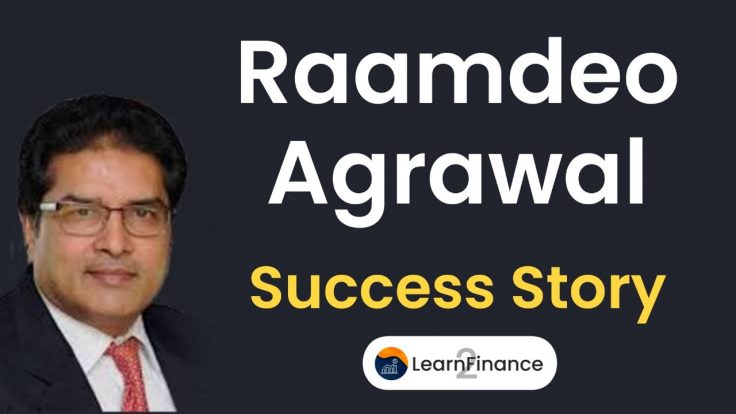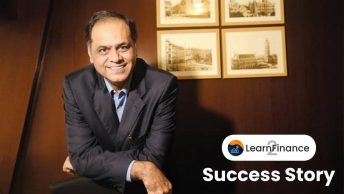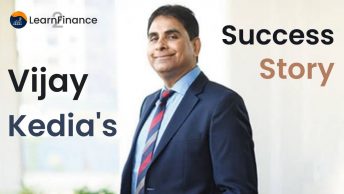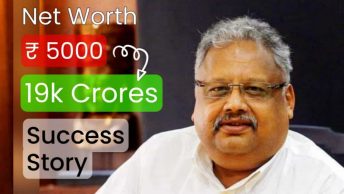The power of compounding, according to Einstein, is the world’s eighth wonder. Raamdeo Agrawal, 59, JMD & Co-Founder, Motilal Oswal Financial Services, is a well-known stock market investor who amassed a wealth of 1000 crores from nothing.
Raamdeo Agrawal is the brain behind Motilal Oswal’s study on mainstream wealth generation. In terms of conjecture, he does extensive study on companies and many topics.
Raamdeo Agrawal possesses exceptional investment skills in identifying potential multibagger stocks. Raamdeo Agrawal is a self-made millionaire with a fortune of $1 billion.
Raamdeo Agrawal grew up in a middle-class family. He was living in a community in a distant location where there was no power and no legal streets. Raamdeo Agrawal opted to pursue chartered accountancy in Mumbai after finishing his normal schooling. Raamdeo battled a lot and finished chartered accounting in five years.
He met Mr Motilal Oswal while studying. After completing research, they decided to form a partnership and join the stock market. In 1987, they founded the sub-broking business “Motilal Oswal.” Motilal Oswal grew from a modest sub-broking business to a large financial services provider today.
Mr Raamdeo Agrawal made a lot of money in the stock market because he is very skilled at picking stocks. He is an analyst and value investor, and Hero Honda was his first multi-bagger stock selection in 1997. He purchased Hero Honda shares in search of an emerging business opportunity in the motorbike industry. Hero Honda has to be one of his first multi-bagger stocks.
In 1998, Raamdeo Agrawal’s next pick was Infosys. Wherever he sees a potential of a global Y2K boom. The adventure continues with a stock selection of Airtel, where a potential for mobile business was known.
The path to being a billionaire:
What began as a small stock broking firm has grown into Motilal Oswal Financial Services Limited (MOFSL), a well-diversified financial services organisation that assists in the creation and growth of wealth for thousands of its customers. Agrawal recalled what worked for him when he was establishing the firm, saying that one must be honest and really desire what is best for one’s customers. “Our aim was to really assist individuals in making money in the stock market, and in doing so, I made money as well.” Honesty toward all stakeholders, he asserted, accumulates over time. “Whether it’s with income tax authorities, creditors, or your family, being honest and having a strong value system will get you a long way.
Agrawal, who has a net worth of $1 billion as of 2021, had a modest upbringing. Born in a tiny hamlet in modern-day Chattisgarh, he travelled to Mumbai to obtain a Chartered Accountant degree before starting his career as a sub-broker in 1987.
Agrawal went on to say that while you may start at zero, you must remember four things if you want to be successful: have ambition, don’t compromise on ideals, give it time, and stay focused. What actually counts is turning your passion into a career.
The QGLP investment concept is as follows:
According to Agrawal, who began investing in 1987, if you begin investing at the age of 25 and continue to do so, you may build a substantial amount of money by the time you retire. “Keep in mind that you are purchasing for the next 30 years, not the next five. ‘Buy Right, Sit Tight’ is the way to invest in the market; the biggest danger is not investing “he remarked, reflecting on his personal experience of not abandoning the marker, even in difficult circumstances.
Agrawal elaborated on Motilal Oswal’s investment philosophy QGLP (Excellent, Growth, Longevity, Price), which assists investors in selecting quality equities at a fair price, saying it’s a checklist for the very minimum you should look for when purchasing a firm. Understanding the management’s expertise and honesty is equally vital – both must be of the highest calibre. If one is missing, the whole equation suffers. Once you’ve established quality, you’ll need to focus on long-term growth. And in the long run, value is what you receive. “What you pay for is the price, but what you get is the value.”
Raamdeo Agrawal’s multibagger stock mantras:
Mr Raamdeo Agrawal is extremely generous with his expertise. He gave investors five mantras for identifying multibagger stocks.
1. Return on Equity
The Return on Equity (RoE) is an essential criterion for stock selection. The company’s return on equity (ROE) should be at least 20%. A firm with a poor RoE should never be considered. Furthermore, the company’s RoE should be growing. It should not be in decline or at a standstill. RoE implies that the firm is allocating cash wisely and producing higher returns.
2. Terms of Trade
The second factor to consider while selecting stocks is the Terms of Trade. Check to see if the firm may exchange the product for cash on delivery or on a prepayment basis. The credit period reflects product demand and strength.
A firm that gives a lengthy credit duration implies that the market demand for the goods is minimal, as the company must entice the customer to acquire the product by offering a long credit period. A firm with a prepayment product, on the other hand, shows that the consumer is willing to pay money upfront to obtain the goods and that competition is low.
3. Flow of Cash
The second step is to examine the company’s cash flow, which should be positive in terms of operating cash flow and free cash flow. The cash flow of a firm reflects its profitability. To understand cash flow, you must first examine the company’s cash flow statement. If the company’s cash flow is strong, go for it.
4. The Company’s Longevity
Examine the company’s lifespan. How long will the corporate boom storey continue? Predicting lifespan is just a matter of experience. Can the stock become the next McDonald’s, where franchise demand will last forever, or will it implode like Kingfisher Airlines?
5. Competition
Check if the company will be able to withstand the competition in the market or not. If a company is generating good revenue it is likely to face big competition, but there is an entry barrier or monopoly product it will rule the market.
Conclusion:
When asked if he’s happy with the money he’s made, the market veteran stated that he has plenty and that the game of generating money has evolved. “Now, it’s more about investing quality than watching your net worth rise.”
However, if there is one thing we can all do to help the country’s or our personal progress, it is to pay our taxes on time.
“The quality of the country is defined by the quality of its taxpayers. Everyone, even the wealthy, should not avoid this duty.”






